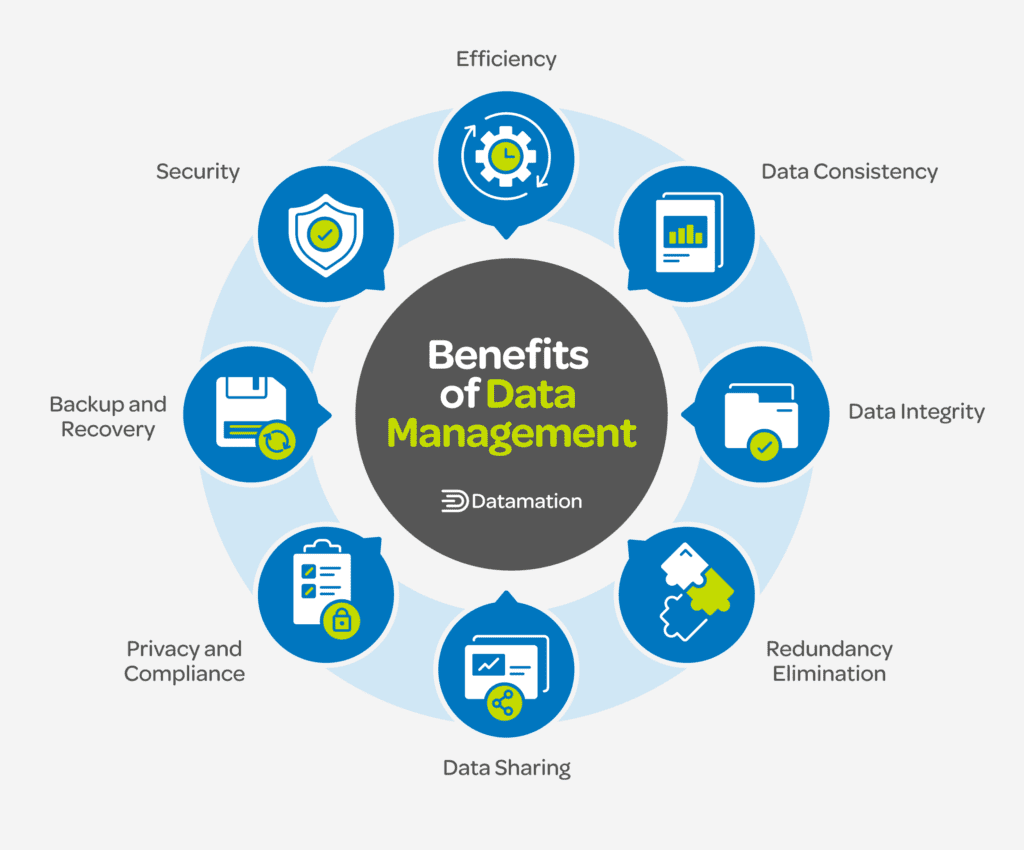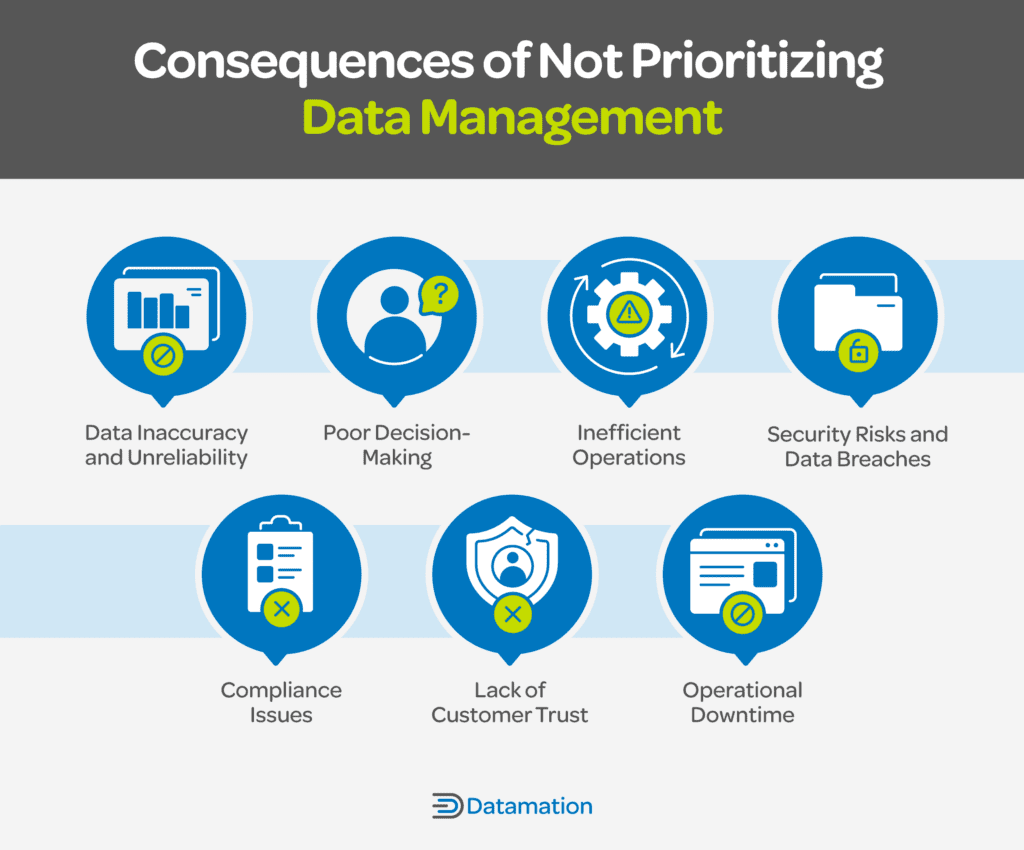
Data management—the process of organizing, storing, securing, and analyzing data throughout its lifecycle—is essential to make sure the information your business uses to make decisions is accurate and reliable. It can also keep you in compliance with regulations and laws that protect consumers and privacy.
Because it encompasses the efficient handling of information through all stages of an organization’s relationship with data, from its creation through its destruction, data management is a broad field with a number of components that offer benefits to enterprises of all sizes. Understanding the value, applications, and benefits of data management—as well as the consequences of not prioritizing it—is a critical part of modern business practice.
In a nutshell, data management is the strategic handling of information for usability and integrity. It introduces a number of benefits for your organization, including streamlined processes, ensured regulatory compliance, and heightened data security. Data management can also boost business performance and give you an edge over the competition.

Data management can help streamline processes across all areas of an organization by organizing and optimizing data workflows and automating repetitive tasks, leading to minimized redundancies and unnecessary steps. This includes implementing automation tools for routine data processes and efficient data storage and retrieval, resulting in significant time savings.
Automation tools can also handle data cleansing, validation, and integration processes, allowing organizations to streamline workflows and make it easier to quickly locate and access information, decreasing the time and effort spent searching for relevant data.
Different types of data management can be used to enforce standardized formats and structures to maintain consistency, which is essential for accurate reporting and analysis. By preventing variations in data handling and storage, your organization can rely on a unified and consistent dataset for more reliable insights and better decision-making. This standardization extends to metadata management, ensuring that data definitions and classifications have uniform application.
Data management entails implementing processes to validate and verify data accuracy and consistency, promoting reliability and trustworthiness. Data management practices include robust data validation and cleansing processes that systematically review and rectify inaccuracies, inconsistencies, and missing values in datasets. By regularly checking and cleansing data, organizations upgrade its overall quality and reliability. Additionally, data validation prevents errors that could compromise decision-making and business processes.
By centralizing storage, standardizing data formats, and implementing processes like deduplication and cleansing, data management eliminates redundancy. This promotes data consistency, reduces storage costs, and enhances retrieval processes. Data management fosters a more accurate data environment, positively impacting business operations and organizational outcomes.
Data management enables seamless data sharing across departments and teams by providing a structured approach to storing and accessing data. This shared access to information promotes transparency and guarantees that all stakeholders can access the most up-to-date data.
Data management protects privacy with strong security measures like encryption, access controls, and data anonymization to safeguard sensitive information, ultimately maintaining compliance with privacy regulations. By managing data in a secure and privacy-conscious manner, your organization builds trust with individuals and avoids potential legal and reputational risks associated with privacy breaches.
With data management, you can also trust that your data handling practices align with industry-specific requirements, such as GDPR, HIPAA, or other regional data protection laws.
Data management includes in-depth backup and recovery strategies to prevent data loss in case of unforeseen hardware failures, natural disasters, or cyber-attacks. Regular backups make sure that your company can recover its data quickly and minimize downtime, keeping your business running smoothly and preventing potential financial and reputational risks.
You can protect sensitive information from unauthorized access and reduce the risk of data breaches and cyber threats with data management. The process strengthens security by deploying access controls, encryption, and regular security audits. This not only preserves valuable organizational data, but also maintains the trust of stakeholders by reducing vulnerabilities and possible points of exploitation.
Data management enables trustworthy operations, secures sensitive data, and cultivates a positive reputation for organizations in different fields. It is especially indispensable in the finance, healthcare, and manufacturing sectors, where precision is paramount for decision-making and compliance. The following real-life examples underscore why data management is important for several industries:
In the field of education, data management fuels informed decision-making, personalized learning, and efficient resource allocation, equipping educators to analyze student performance, attendance, and demographic information and leading to tailored instructional strategies and elevated educational quality.
Use Case
Educational institutions may use data management in the form of predictive analytics to identify students at risk of falling behind. By analyzing historical data, schools can intervene early, providing targeted support to struggling students, boosting student success and retention rates. Following data management best practices lets educators use insights for continuous improvement for a data-driven culture that enhances educational outcomes.
The importance of data management in healthcare lies in optimizing patient care, streamlining healthcare operations, and facilitating evidence-based decision-making. Comprehensive data empowers healthcare professionals to deliver personalized care and detect trends.
Use Case
Healthcare organizations can use data management platforms, such as electronic health records (EHRs), to securely store and access patient information. This leads to more coordinated and systematized care, with the additional benefit of supporting data analysis for population health management.
Understanding the importance of data management in research is essential. The process maintains the integrity of research findings and ensures they are accessible and reproducible. Furthermore, data management brings a structured approach to handling large data volumes that experiments or studies generate, resulting in reliable and valid results.
Use Case
Data management in research facilitates open data sharing. Researchers can use data management protocols to make their datasets easily accessible to other researchers, supporting collaboration, accelerating scientific discovery, and allowing for the validation of research findings by the broader scientific community. Moreover, open data sharing promotes transparency and encourages innovation in various fields of study.
Data management is imperative for understanding customer behavior, optimizing campaigns, and maximizing the return on investment in the marketing industry. It enables businesses to collect, analyze, and leverage customer data to create targeted and personalized marketing strategies.
Use Case
Data management holds a critical role in marketing. For example, it supports the customer segmentation process, which groups customers based on shared characteristics. This process involves analyzing data from demographics, behavior, and transactions. Using this data, marketers can craft campaigns that directly appeal to specific customer groups. This targeted strategy amplifies customer engagement and elevates conversion rates.
In supply chain management, effective data management is important for enhancing logistics and reducing operational costs. It involves handling data related to inventory levels, order processing, shipping, and supplier relationships. Proper data management guarantees the availability of accurate and timely information across the supply chain, so businesses can respond quickly to changes in demand or disruptions.
Use Case
Data management can be used for demand forecasting in supply chain management. By looking at historical sales data, market trends, and other factors, your business can predict future product demands. This helps optimize inventory levels, preventing stock outs or overstock situations.

While data management can do wonders for your business, failing to make it a priority can have serious consequences too. The absence of a focused approach to data management can hurt your organization’s efficiency, reputation, and ability to compete. Neglecting data management can lead to the following drawbacks:
Data management is not just about handling data, but about harnessing it to drive innovation and business growth. Efficient data management translates directly into tangible benefits for businesses. It is the key to unlocking the power of data, transforming it from raw numbers into valuable insights. Understanding why data management is important will position you to treat your enterprise data as a strategic asset rather than a mere byproduct of operations.
Effective data management supports decision-making, refines business operations, guarantees data integrity, and strengthens security. These benefits collectively contribute to increased customer satisfaction and competitiveness. However, not prioritizing data management can have serious consequences.
Without a plan for handling data, organizations can make decisions based on incomplete or inaccurate information. This could bring about ineffective operations, wasted resources, and missed opportunities. Additionally, data integrity and security can be compromised, damaging customer trust and exposing the organization to legal and regulatory risks.
Data management tools offer a range of features and capabilities that streamline various aspects of data management. Read our top 10 Best Data Management Tools to discover the leading solutions that can cater to diverse organizational needs.

Datamation is the leading industry resource for B2B data professionals and technology buyers. Datamation's focus is on providing insight into the latest trends and innovation in AI, data security, big data, and more, along with in-depth product recommendations and comparisons. More than 1.7M users gain insight and guidance from Datamation every year.
Advertise with TechnologyAdvice on Datamation and our other data and technology-focused platforms.
Advertise with Us
Property of TechnologyAdvice.
© 2025 TechnologyAdvice. All Rights Reserved
Advertiser Disclosure: Some of the products that appear on this
site are from companies from which TechnologyAdvice receives
compensation. This compensation may impact how and where products
appear on this site including, for example, the order in which
they appear. TechnologyAdvice does not include all companies
or all types of products available in the marketplace.